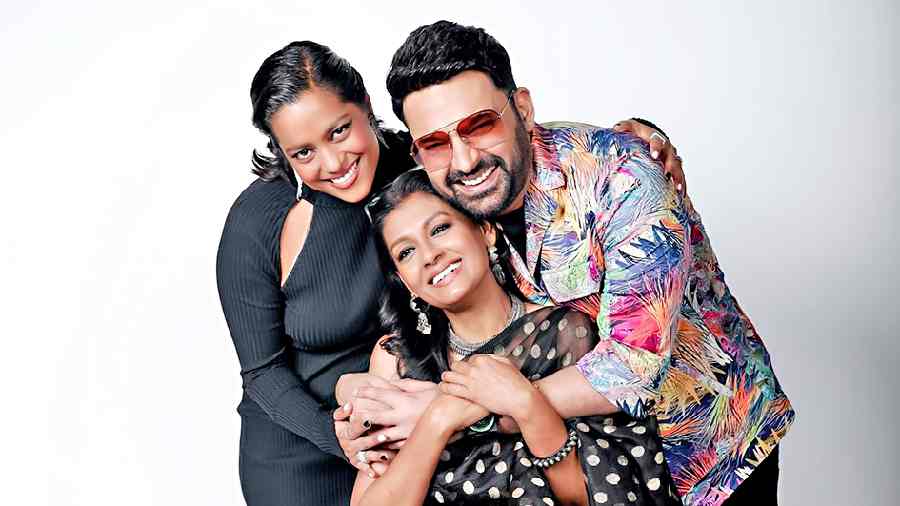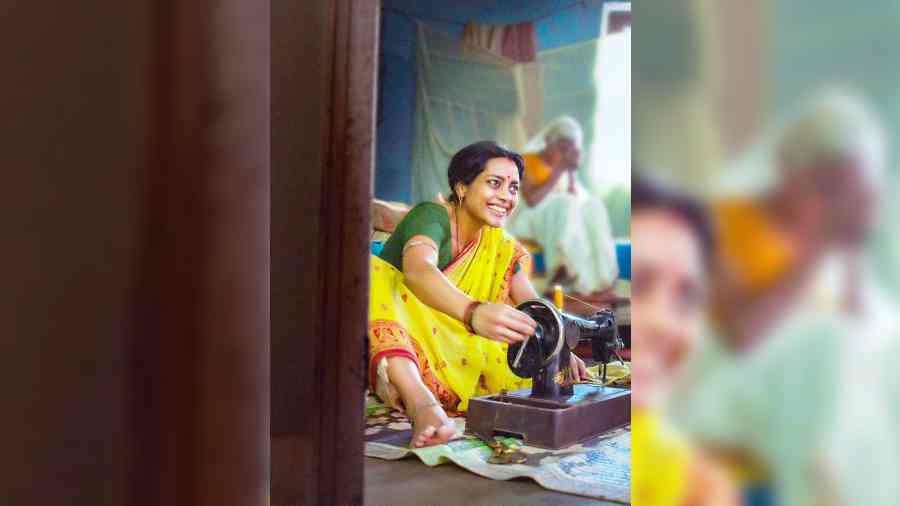Over the years, Shahana Goswami has carved a niche for herself, one performance at a time. This Friday, the actress will be seen in Zwigato. Starring comedian-actor Kapil Sharma in the lead, Zwigato is a heartwarming, slice-of-life film directed by Nandita Das. Shahana — who also starred in Nandita’s debut directorial Firaaq — chatted with The Telegraph on her new film, Kapil the actor and why women need to organically be part of projects.
Busan to Toronto, Zwigatohas already made a mark at film festivals around the world. Does that ease the nerves as we move towards the film’s release?
I first watched the film at Busan. I was really, really nervous. Not nervous about the film as a whole, but about watching myself on screen. I was pleasantly surprised to see that I didn’t have that much of a problem with what I did (laughs)
It’s one thing to read a script and it’s a totally different ballgame to see it all come together. I think it’s a really beautiful film. I am not the kind of actor who gets overly attached to my projects... I always have a sense of objectivity while watching a film that I am a part of.
Zwigato has this magical quality that allows you to feel light. You feel various emotions throughout the course of the film, but the film itself doesn’t feel heavy at any point. Yet at the end of the film, you are left with all those bubbles of energy and emotion that have happened in you throughout the film. I cried at the end just looking at how beautifully it all came together. That, for me, has been an unusual response to my own film. I mean that it’s such a good film that I even forgot I was in it (smiles). It has that kind of craftsmanship that makes you believe that you are watching someone else’s story.
Have you always been this conscious and critical of yourself on screen?
I am becoming a lot better! It’s not that I am self-critical for no reason, I view myself as an audience. These days, we watch content from all over the world and I aspire to reach the highest level in terms of my performance. I am not a trained actor and I always think that there is more that I can bring to a performance. I am trying to incorporate that without putting down what I finally come up with on screen.
You may not be trained but you have a wealth of experience, and that definitely counts...
Absolutely! I suppose there is a reason why my career is designed like this. I am a person who learns through practical experiences. I am not a theory person at all. I have learnt so much just observing and working with amazingly talented people. I think I have even learnt so much through osmosis, by just being around these people (laughs).

Shahana with Nandita Das and Kapil Sharma
Coming back to Zwigato, what is it about your character Protima that spoke to you?
Sometimes characters are written in such a way that it’s a given that they will succeed in impacting the audience. Protima is that kind of person... she exudes energy and warmth and a spirit of hope and joy.
Honestly, there is a part of me that is like that. I am an eternal optimist, I like .spreading joy, I love spreading love... So it was nice to embody that in a character and realise that side of myself. Protima brings light and hope into the film.
And how is she different from you?
The obvious difference is that she belongs to a lower-middle-class family. And while I don’t belong to that strata, I have been very close to that setting because when I was growing up, my father (economist Omkar Goswami) was teaching and we used to stay on campus, and naturally all my friends were the staff’s kids. I was in and out of their homes. There would be gujiya being made for Holi, we would play Pitthu and climb trees. There was some kind of subliminal breaking of whatever boundaries that may have existed naturally.
But yes, I haven’t lived that life. I have never been made to feel that there was anything that I couldn’t do, whether as a child or as a woman. That sense of freedom that I have had throughout my life is a privilege, irrespective of the class I belong to. That itself sets me apart from almost every character that I have played. The larger socioeconomic realities of Protima have not been mine and I don’t know them.
You were directed by Nandita Das in her powerful debut Firaaq. How have you seen her evolve as a film-maker since then?
It’s almost like watching a tree grow. It’s rooted in the same place but its branches are growing wider and thicker. She has always been extremely focused and jumped between various roles, giving her utmost attention wherever she has been at that point in time and yet keeping a larger overview of how exactly she wanted the tone and feel of her films to be.
Firaaq was not an easy film to make. She did a fantastic job of it, maintaining an element of neutrality and yet bringing such deep humanity to it. Nandita doesn’t tell, she doesn’t judge... she shows you a mirror of how society is.
Zwigato is also a film like that. It shows a mirror to a slice-of-life world and a milieu that exists around us all the time and yet we don’t see it. So while Nandita has grown as a film-maker, she has still retained her original understanding, belief and vision.
Kapil Sharma is cast against type in Zwigato. What was your reaction when you heard he was doing this film and did he surprise you on set?
Honestly, I had no context. And even Nandita hadn’t seen the show (The Kapil Sharma Show) before she cast him... she had seen a clip of him at an award function and then she met him and realised that her instincts were correct about him being right for the part.
It was the same for me. I have still not seen an entire episode of Kapil’s show. I knew that he is a huge star and everyone talks about him, but I had no notion of him, per se. But yes, I was curious to know why people had that kind of a surprised reaction when they heard he was doing a Nandita Das film.
Very soon after that I met him at Nandita’s house and immediately I could see why he is the way he is. He is so rooted, witty and intelligent. He has done so much theatre in his life and he is very rooted to who he is and where he comes from. He is empathetic. All those things make for a good actor.
The part that he plays in Zwigato is not difficult for him because that’s a reality that he has lived for many years. Today it may seem different to people because of his fame and lifestyle, but he comes from that world, or a similar enough world.
And he’s a very good actor. He was great at creating a scene and my responses and reactions came out because of the energy that he brought to a moment. I hope more and more film-makers take a cue from Nandita and cast actors outside of the cliched notions that one may have of them.
That holds true even for me because people have only seen me in a certain milieu and perhaps no one but Mira (Nair) would have given me a role like Meenakshi (in A Suitable Boy). People have always been, ‘Give Shahana the earthy, intellectual parts’. I appreciate when people give you a chance to do something different because they trust your intelligence and your capacity as an actor to mould yourself to be different characters.
Your last two projects — Bombay Begums and Hush Hush — have had you being part of a women-dominated ensemble cast. While it’s great to see women having agency on screen and headlining stories, do you think there is the danger of formula overkill at some point?
If the intention is, ‘Let’s get a female cast and a female director and that will help greenlight the project,’ then it won’t work. Because then again, you are falling into the pit of content being determined by fad and commerce. To me, anything that is done for female empowerment is to bring the balance back. So if you start tilting the balance the other way, then that’s also a problem. While I am all for women organically taking up roles of importance in the making of a project, I also don’t understand the unnecessary celebration carried out by some people that so and so project had an all-female crew. That to me is an imbalance, a kind of sexism that I don’t endorse.











